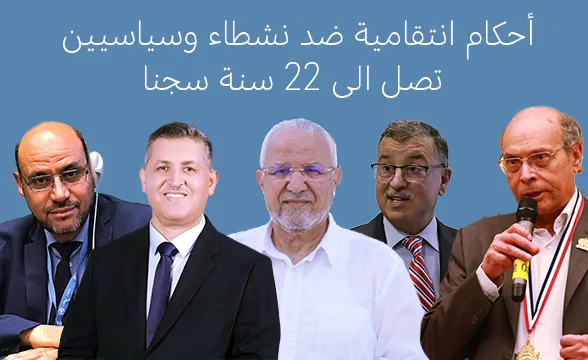On June 20, 2025, the Criminal Chamber specializing in terrorism cases at the Tunis Court of First Instance issued in absentia sentences of 22 years in prison with immediate effect against former Tunisian President Moncef Marzouki, former President of the Tunisian Bar Association Abdelrazak Kilani, former Presidential Chief of Staff and former MP Imed Daimi, and two other defendants in the same case, Abdennacer Naït Liman and Adel Mejri.
These defendants were referred to court on charges of committing “terrorist crimes” and “conspiring against state security,” without being able to exercise their right to a defense or to be physically present before the court. This case is one of the most prominent cases brought against high-profile opposition figures in recent years, brought to justice as part of a political campaign to suppress dissenting voices.
Background of the case:
This case is part of an escalating series of politically-motivated cases targeting prominent figures in the Tunisian political scene, particularly those who played pivotal roles in the post-revolution period and were prominent defenders of human rights and civil liberties. Moncef Marzouki, the first democratically elected president after the revolution (2011–2014), continued his involvement in opposition activities after the end of his term and explicitly called for a restoration of the constitutional process following the decisions of July 25, 2021. Imed Daimi, meanwhile, held leadership positions in the presidency and parliament and was known for his oversight activities through the establishment of the “Oversight Observatory,” which uncovered numerous corruption cases. Abdelrazak Kilani is one of the country’s most prominent human rights voices, having held union, government, and diplomatic positions before being targeted in politically charged cases.
The Freedom for Tunisia Observatory believes that the current case was opened directly as a result of the defendants’ human rights activism, including their documentation and publication of details of violations committed by judges or judicial practices that violated fair trial guarantees. This appears to have provoked the ire of both the political and judicial authorities. This judicial referral comes amid a general climate of sharp institutional decline since President Kais Saied consolidated power in 2021, and the intensification of the persecution of political opponents, human rights defenders, and media professionals. It is also noteworthy that a large number of these cases are based on vague charges under the anti-terrorism law, without any real evidence of criminal intent or actions, which reinforces concerns about the judiciary being used as a tool to settle scores with regime critics.
Trial in Absentia Lacks Guarantees:
The Tunisia Freedom Observatory asserts that the trial in this case lacked the minimum guarantees of a fair trial, including the presence of the defendants and their lawyers, and the ability to respond to the charges or discuss the evidence before an independent and public court. The issuance of heavy sentences in absentia, in a context characterized by the exclusion of opponents and the closure of the political sphere, cannot be separated from the general climate of serious deterioration in freedoms and judicial independence.
UN rapporteurs and experts from organizations such as Human Rights Watch and Amnesty International have previously expressed concern about the systematic exploitation of the judiciary in Tunisia against the political opposition, particularly when charges of “terrorism” or “conspiracy” are used to criminalize peaceful political activities.
The Freedom for Tunisia Observatory calls for:
- Quashing the sentences issued against Moncef Marzouki and the rest of the activists, and re-opening the case under the conditions of a fair trial that respects legal and international guarantees.
- Stopping the persecution of political opponents under the pretext of terrorism or conspiracy, especially those who engage in political and civil activities through peaceful means.
- Protecting the judiciary from political manipulation and ensuring its effective independence from the executive branch.
- Respecting the principle of non-impunity by opening investigations into judicial and human rights violations committed in the name of the law.
- Activating independent international oversight of political trials in Tunisia, through fact-finding missions or neutral legal observers.





